Enterprise to the fore with Marc Koska OBE
Tue, 18 Sep 2012 12:08:00 BST
Staff Enterprise Awards presented
Innovation was at the forefront of the University’s Research Dinner with a talk by inventor and entrepreneur Marc Koska OBE and the presentation of the new Staff Enterprise Awards.
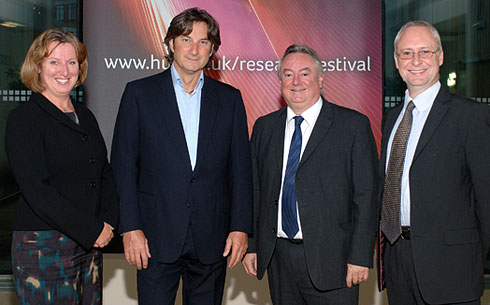
Pictured at the University's Research Festival is Emma Hunt, Dean of Art, Design and Architecture (far left) standing alongside inventor and entrepreneur Marc Koska OBE, Professor Bob Cryan and Professor Andrew Ball
Marc Koska was the Dinner’s Guest Speaker and he spoke about his 27-year crusade to stop the re-use of syringes to reduce the spread of blood-borne infections and save lives.
Following many years of research into the issues involved he developed the K1 Auto-Disable syringe that could be made on existing equipment, but with a small modification – though it could be used in the same way, it could not be used twice. This simple innovation provided users throughout the world with a sterile and safe injection.
The inventor followed this with a public awareness campaign, entitled Lifesaver, which he used to fill the information gap between the public, healthcare providers and governments.
Marc Koska’s sense of mission and dedication to saving lives, whilst developing an ethical business, earned him an OBE and later a Queen’s Award for Enterprise.
The University’s new Staff Development Awards
During the Research Festival, the University launched a new award to celebrate and reward the enterprising spirit of the University’s staff and researchers.
The idea was pioneered by the University’s Vice-Chancellor, Professor Bob Cryan, and four prizes were awarded...
- Award for Early Stage Collaboration to Dr Andrew Collett and Dr Nik Georgopoulos for a project with international healthcare company Paxman Coolers.
- Award for Sustained Collaboration to research team IPOS (Innovative Physical Organic Solutions) and its collaboration with multi-national corporation Agilent Technologies.
- Award for a Training or CPD Programme with an External Partner to Val Ely and her work co-ordinating the CPD provision for the National Health Service.
- Award for Most Promising Opportunity to Professor Gary Lucas for his development of new flow-imaging technology.
The Vice-Chancellor’s Award for Early Stage Collaboration focuses upon the best example of a project in which nominees have worked with a partner for the first time and had the opportunity to develop a case study.
Below: Dr Andrew Collett (left) and Dr Nik Georgopoulos (centre) receive their award
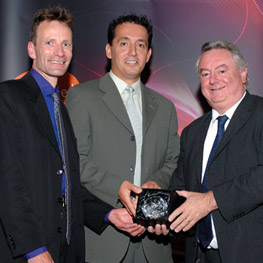 Paxman Coolers applied for a Kirklees Innovation Voucher during 2011 to work with biologists Dr Andrew Collett and Dr Nik Georgopoulos to improve the performance of the company’s scalp coolers, used by cancer sufferers to minimise hair loss during chemotherapy.
Paxman Coolers applied for a Kirklees Innovation Voucher during 2011 to work with biologists Dr Andrew Collett and Dr Nik Georgopoulos to improve the performance of the company’s scalp coolers, used by cancer sufferers to minimise hair loss during chemotherapy.
Following a successful project, the University gained funding for a KTP with the company. Paxman’s successfully applied for a Technology Strategy Board grant to improve the comfort and usability of the cap and have subcontracted further work packages to the Huddersfield biologists.
In addition, lecturers Dr Ertu Unver and Chris Howard from the University’s School of Art, Design and Architecture are advising the company on how to utilise anthropometric data on head sizes to refine and streamline their range of cap designs.
The Vice-Chancellor’s Award for Sustained Collaboration demonstrates how an initial collaboration led to an externally co-funded project.
Below: Dr Nick Powles (left) and Dr Matt Stirling (centre) receive their award
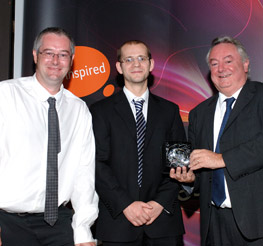 The winner was the collaboration between the University’s research team IPOS (Innovative Physical Organic Solutions) with the multi-national corporation Agilent Technologies. IPOS has built up a very strong relationship with this company, being the only UK-based Agilent Centre of Excellence.
The winner was the collaboration between the University’s research team IPOS (Innovative Physical Organic Solutions) with the multi-national corporation Agilent Technologies. IPOS has built up a very strong relationship with this company, being the only UK-based Agilent Centre of Excellence.
The award was collected by IPOS researchers Dr Nick Powles and Dr Matt Stirling. IPOS has special expertise in the analytical chemistry technique of liquid chromatography and mass spectrometry and it regularly works closely with Agilent to develop new technologies and methodologies. The relationship also helps IPOS to deliver CPD and training courses for companies.
Over the last 12 months, IPOS has worked on 26 different collaborative projects and the relationship is due to expand into other analytical areas such as gas chromatography and spectroscopy. And several large-scale collaborations between IPOS and Agilent are in the pipeline.
The Vice-Chancellor’s Award for a Training or Continuing Professional Development Programme with an External Partner focuses upon the best example of a research-based CPD or training programme that was instigated and applied by a member of University staff.
Below: Val Ely receives her award
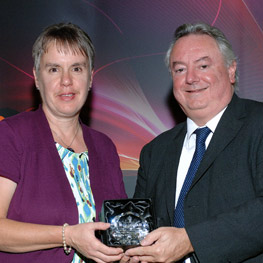 The winner was the NHS and the University’s School of Human and Health Sciences CPD provision co-ordinated by health tutor Val Ely.
The winner was the NHS and the University’s School of Human and Health Sciences CPD provision co-ordinated by health tutor Val Ely.
The University of Huddersfield’s School of Human and Health Sciences is the largest provider of health and social care CPD courses within the Yorkshire and Humber area. A broad range of courses have been run for health sector employees, ranging from acute care and advanced practice to leadership and management for healthcare practice. All courses are tailored to develop specialist skills and, where appropriate, they draw on the high-class facilities including simulation techniques which are available at the University.
The Vice-Chancellor’s Award for Most Promising Opportunity featured the best example of the most promising research-based opportunity that focuses upon enterprise or Intellectual Property disclosure.
Below: Professor Gary Lucas receives his award
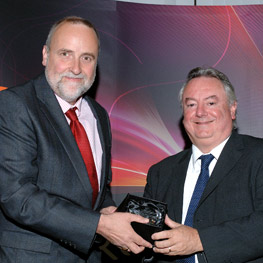 The winner was Professor Gary Lucas for the development of new flow-imaging technology which has application in the measurement of both single and multiphase flow conditions.
The winner was Professor Gary Lucas for the development of new flow-imaging technology which has application in the measurement of both single and multiphase flow conditions.
Electromagnetic Velocity Profiling, as the technology is termed, is potentially a cheaper and more accurate alternative to existing technologies for a flow measurement in a wide range of applications. IP licensing is being actively pursued for use in both oil and gas and industrial processes. As a parallel development, research continues on use of the technology in medical field, for example, blood-flow monitoring.







